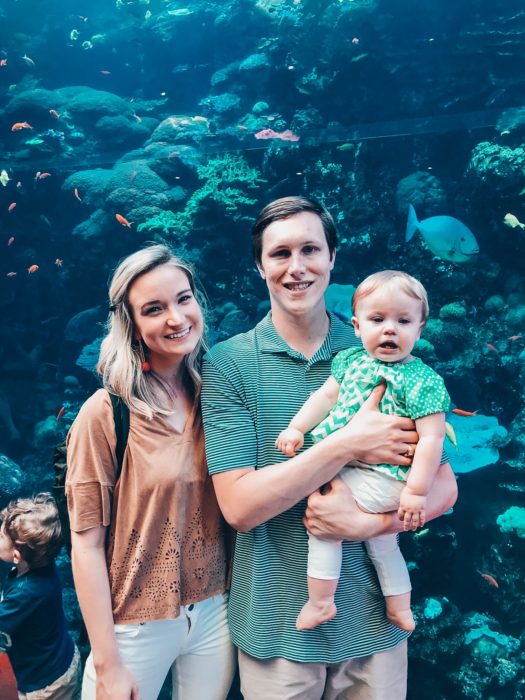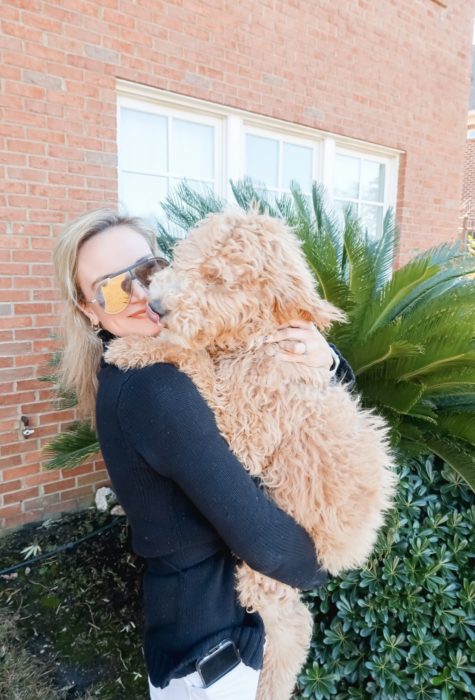Breastfeeding was by far the thing that scared me most when I was pregnant. My friends would always ask me, what are you most freaked out for, and I would always say, “Breastfeeding!” They would (rightfully) be so confused by this answer. Isn’t breastfeeding supposed to just come naturally to moms? Isn’t it in our nature? Don’t most mammals do it? NEWSFLASH! If you guys didn’t already know this, let me be the first to tell you, breastfeeding is not that simple.
In my opinion, there is way too much pressure on mothers to breastfeed their children, and here’s why: it’s nutritionally better for children. It gives them all of the nutrients they need, while also helping build their immune systems most efficiently. I’m not going to sit here and act like that’s not true, but if for whatever reason a mom decided that breastfeeding isn’t for her, formula babies do just fine, too.
Both options have their advantages. As I said above, breastfed babies get all of the nutrients they need in their mother’s milk. Breastfeeding (once you get the hang of it) is also convenient. If the babies hungry, you can feed them right away with no extra stuff to deal with. It’s also free, of course. With formula, they babies aren’t tied to the mothers. Anyone can feed them with a bottle. Formula babies also sleep for longer stretches sooner.
Before I had Hollings, I read up on all of the breastfeeding horror stories. There were stories about how incredibly painful it is. There were stories about mastitis, which is a very common infection breastfeeding women get in their breast tissue. There were stories about women who tried and tried to breastfeed, but just didn’t have the sufficient tissue to produce enough milk.
To top off all of my anxiety about breastfeeding, about a week before I had Hollings, I received a card from someone who signed it, “…and remember…breast is best!” I hate that term. You know what’s best? Fed. Fed is best, in whatever way works for you.
When I had Hollings at Duke, they had a lactation consultant come in almost immediately after. Most hospitals want the mom to attempt feeding within an hour of birth. The lactation consultant who came in was a very kind, but also somewhat aggressive woman, which is honestly what I needed. She grabbed Hollings face and shoved it onto my nipple to get her to latch on. I thought I was a natural.
In the first 24 hours of life, pretty much all the baby does is sleep. Still, the baby needs to eat every 3 hours for the first two weeks around the clock (including middle of the night which means there are times you have to wake the baby when all you and the baby want to do is keep sleeping). After those two weeks, you continue to feed the baby every 3 hours during the day, but can do on-demand night feedings (meaning just whenever the baby wakes up hungry). I would wake Hollings up in those first 24 hours, and she just would not be interested in eating for long. She was so sleepy. Still, I had to do it. I would feed her for maybe 5 minutes on one boob, and she would just fall back asleep (in the beginning, a normal feeding is 30-45 minutes total).
Sometime in those first 24 hours, a different lactation consultant came in than before. I was in the middle of telling her about how Hollings continued to fall asleep while I was feeding her, when she cut me off by saying, “If the feeding is not at least 8 minutes on each breast, I’m NOT interested.” This stressed me out immensely. I was so worried that I was starving my baby. I became obsessed with this thought. My hormones were still going crazy from labor, so I would cry about it constantly. These worries were nothing compared to my next obstacle, which began around day 3 after Hollings was born – the pain.
You guys. The pain. I’m not sure what was going on, but I thought my nipples were going to fall off. I was producing a ton of milk, and Hollings’ latch was fine. For some reason, I just dealt with a crazy amount of pain. I would watch Hollings while she slept with tremendous anxiety, because I knew it was only a matter of time before she woke up and destroyed me. Imagine feeling that way before 12 feedings a day. It was a dark time for me. Whenever she would latch, I would yell very bad words. Poor Jay would just look at me with concerned eyes, while my mom would say, “I know it hurts, Leigh. I went through the same thing, but you just have to keep pushing through, and I promise you, you’ll be glad you stuck with it.”
Thank goodness I had my mom there encouraging me. She kept reminding me how easy it would be once my body got through this learning period. I understood completely why some women decide that it’s just not for them. All I could do was just keep reminding myself the benefits of breastfeeding. I bought hydrating nipple pads called “hydrogels” that I would wear between feedings. These were amazing. I recommend them to anyone going through this type of pain.
After about two weeks of this pain, I began searching the internet for some sort of support. I went to google and typed in, “When does breastfeeding get easier?” The common response? The 6 week postpartum mark. “6 weeks???” I thought, “That’s still 4 weeks from now! That’s a month! I can’t go that long!” I called my mom, and again, she reassured that if I could get to that point, I would be so grateful that I stuck with it.
So I did. I endured about 2 more weeks of excruciating pain. Around 4 weeks postpartum, I felt a noticeable difference in the pain (in a good way). I no longer screamed out in pain. It was still uncomfortable, for sure. I would wince whenever she latched, but hey, it was a victory in my book. The online comments were right. I stopped feeling pain all together around 6 weeks postpartum.
My mom was also right. I am so incredibly happy that I stuck with it. If anyone reading this is struggling with breastfeeding, I encourage you to keep pushing through. While I never seriously thought about stopping, it was painful enough to for me to understand how women who had it worse than I did chose to stop. I’ve now been breastfeeding for 7 months, and I LOVE it. I seriously love everything about it from the ease of being able to feed Hollings without any materials if we’re out for the day, to the bonding time it allows us to have 4 times a day. My goal is to breastfeed her up to a year. I already think about the days when I’ll no longer be breastfeeding her and it makes me sad. At the same time, I know it’ll be nice for my body to be MY body again. Still, I’ve loved my times feeding Hollings. I know I’ll miss them when they’re gone.



